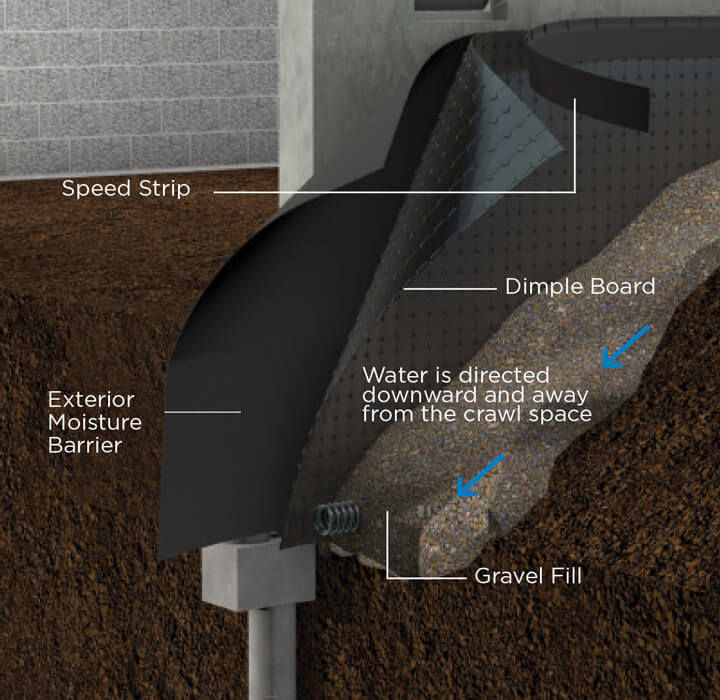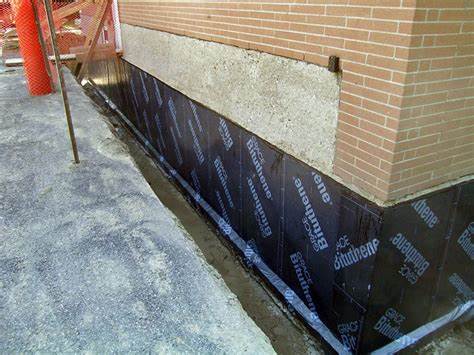6 Smart Exterior Drainage Solutions That Homeowners Swear By
Discovering the Numerous Approaches of Cellar Waterproofing and Their Advantages
Basement waterproofing is important for preserving a steady and completely dry atmosphere. Different approaches exist, each with distinctive benefits. Inside sealers secure versus wetness invasion, while outside systems attend to drain problems. Sump pumps and French drains handle water efficiently, and dehumidifiers manage humidity levels. Understanding these options can help homeowners make educated choices. Yet, the appropriate remedy commonly relies on certain scenarios and requirements. What elements should one consider when choosing the ideal technique?
Interior Sealants: An Effective Obstacle Against Moisture
Inside sealants act as an important line of protection versus moisture breach in cellars. These products are made to produce a water resistant barrier on floorings and wall surfaces, efficiently avoiding water from permeating in. Available in numerous types, consisting of paints, sealers, and finishings, they can load cracks and pores in concrete, making certain a much more secure environment.The application procedure typically includes cleaning the surfaces to get rid of dirt and particles, followed by the cautious application of the sealant. When healed, these products improve the resilience of the cellar while reducing humidity degrees, which can bring about mold development and architectural damage.Moreover, interior sealants are usually easy to apply and can be a cost-effective service for home owners looking to alleviate dampness issues. By offering a trustworthy layer of protection, they play an essential function in guarding the cellar space, preserving both its stability and functionality.
Outside Waterproofing Equipments: Protecting Your Foundation
Outside waterproofing systems use a robust service when property owners seek to protect their structures from water damages. These systems normally include applying waterproof membrane layers and water drainage systems to the exterior walls of a cellar. By producing a barrier against groundwater, they properly protect against wetness from permeating the foundation (Basement Waterproofing).One noteworthy benefit of outside waterproofing is its capacity to address the resource of water breach before it gets to the interior. This proactive strategy not only safeguards architectural stability but additionally improves the longevity of the home.Moreover, outside systems can improve the total drainage around the structure, decreasing hydrostatic stress. This lessens the chance of fractures and heaving that can result from water buildup. Consequently, home owners can delight in a completely dry, steady cellar environment, substantially enhancing residential or commercial property worth and comfort. Eventually, outside waterproofing systems are a vital financial investment in preserving a healthy and balanced home foundation
Sump Pumps: Handling Water Buildup Effectively
Sump pumps play a crucial role in handling water buildup in basements, supplying an effective service for homes vulnerable to flooding or excess dampness. These gadgets are set up in sump pits, typically located at the least expensive factor of a basement, where they gather water that leaks in from the bordering soil. When the water level increases, the sump pump triggers, successfully pumping out the excess water to a designated drain location, therefore preventing potential damage to the structure and indoor spaces.There are 2 major sorts of sump pumps: submersible and pedestal. Submersible pumps are set up underwater, making them much less noticeable and usually quieter, while stand pumps are positioned above the sump pit and are easier to maintain. By efficiently handling water build-up, sump pumps not only secure against structural damage however likewise contribute to a healthier living atmosphere by decreasing humidity levels and avoiding mold growth.
French Drainpipes: Rerouting Water Far From Your Home

Dehumidifiers: Decreasing Humidity Levels for a Drier Setting
Cellar waterproofing includes different techniques, and dehumidifiers play a significant role in keeping a completely dry atmosphere. By efficiently decreasing humidity degrees, dehumidifiers assist avoid moisture buildup, which can bring about mold growth, architectural damages, and unpleasant odors. These gadgets work by extracting excess dampness from the air, producing a healthier and more comfy space.In addition to boosting air high quality, dehumidifiers can enhance the effectiveness of various other waterproofing methods, such as securing and drain systems. They help keep optimal humidity degrees, generally in between 30% and 50%, which is crucial for avoiding condensation on wall surfaces and floors.Moreover, contemporary dehumidifiers are energy-efficient and come with functions like programmable settings and automated shut-off, making them user-friendly. Overall, including a dehumidifier into cellar waterproofing plans provides a vital layer of defense against moisture-related concerns, thus guarding the home's stability.
Regularly Asked Questions

How Lengthy Do Waterproofing Solutions Normally Last?
Waterproofing options typically last between 5 to two decades, depending upon the technique used, top quality of materials, and environmental problems. Routine maintenance and examinations can assist extend their performance and general lifespan.
Can I Water-proof My Cellar Myself?
The individual taken into consideration whether to water resistant the basement individually. They discovered that while do it yourself choices exist, knowledge of strategies and materials is vital to ensure effectiveness, and specialist support might offer far better long-term outcomes.
What Are the Indications of Cellar Moisture Issues?
Indicators of basement dampness issues consist of visible water discolorations on walls, mildewy odors, peeling off paint, mold growth, and wetness on floors. High humidity degrees may likewise show underlying moisture issues calling for interest to protect against further damage.
Just How Much Does Basement Waterproofing Expense?
The price of basement waterproofing varies commonly, typically ranging from $1,500 to $5,000. Aspects affecting expenses include the intensity of dampness issues, the selected approach, and the geographical area of the home.
Will Waterproofing Boost My Home's Worth?
The inquiry of whether Sump Pump Installation And Replacement waterproofing increases a home's value commonly emerges among property owners. Typically, efficient waterproofing can boost building appeal, reduce damage dangers, and potentially cause greater resale rates, relying on the neighborhood realty market. By developing an obstacle versus groundwater, they effectively prevent moisture from penetrating the foundation.One noteworthy advantage of exterior waterproofing is its ability to address the source of water breach prior to it gets to the inside. Sump pumps play a crucial duty in taking care of water buildup in cellars, offering an efficient service for homes prone to flooding or excess moisture. When the water level climbs, the sump pump turns on, effectively pumping out the excess water to an assigned drainage area, therefore protecting against possible damage to the foundation and indoor spaces.There are 2 primary types of sump pumps: completely submersible and stand. Exterior Drainage Solutions. By routing groundwater and surface water away from the foundation, French drains pipes assistance avoid water accumulation in cellars and crawl spaces, lowering the danger of structural damages and mold growth.Installation generally takes place around the boundary of the home, guaranteeing that water is efficiently drawn away. Signs of cellar wetness issues consist of visible water discolorations on walls, stuffy odors, peeling off paint, mold and mildew growth, and moisture on floors